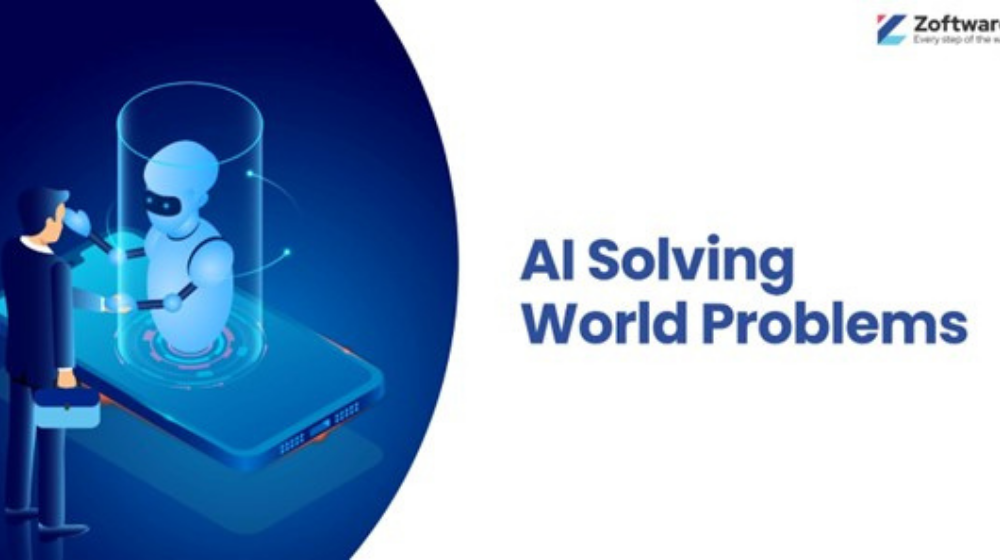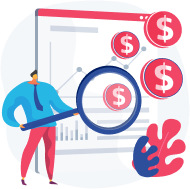Based on information from Statista, the market for artificial intelligence (AI) in Healthcare, valued at $11 billion in 2021, is expected to rise significantly, reaching an estimated value of $187 billion by 2030.
These results show that Artificial Intelligence has benefited businesses and science and laid its hands on the world’s other major and critical areas like Healthcare diagnostic and others.
Artificial intelligence has created a new spectrum of computer science by broadening its limits. The primary purpose of artificial intelligence is to develop machines that can act as human intelligence and ease the complexity of human tasks. This exciting field integrates concepts and elements from psychology, linguistics, and neuroscience. Crazy right?
So, in this blog, we will learn how Artificial Intelligence solves world problems like Healthcare and poverty. You also will explore how AI has evolved in terms of its usage. Let’s start with the meaning of AI for good.
AI for Good
“AI for Good” is like a guiding light for using artificial intelligence (AI) in ways that matter to us all. It’s about thinking beyond profit or tech advancements alone and focusing on how AI can help us tackle significant challenges – like improving health, protecting our planet, and ensuring everyone gets a fair chance in life.
Here’s why this idea is so important:
- Making Lives Better: Imagine Artificial Intelligence being like a helpful friend in healthcare – spotting illnesses early or offering treatments suitable for each person. That could save many lives and ease much pain and worry.
- Looking After Our Earth: Artificial Intelligence can be an excellent environmental monitoring tool. It could help us understand how to use energy wisely, keep an eye on endangered animals, or find more innovative ways to live in harmony with nature.
- Helping in Tough Times: Artificial Intelligence can step in like a super-efficient coordinator in natural disasters or humanitarian crises. It can help determine where help is needed most and ensure aid gets there fast.
- Building a Fairer World: Artificial Intelligence can help level the playing field. It can educate kids in far-off places or offer a helping hand to struggling communities, making sure nobody’s left behind.
- Boosting Economies: AI isn’t just about fancy gadgets; it can spark new industries and jobs, helping economies to grow in a way that benefits everyone, not just a few.
- Keeping It Ethical: “AI for Good” also means making sure Artificial Intelligence plays by the rules – it should be fair, respect our privacy, and make decisions we can all understand and trust.
- Working Together: This idea is all about teamwork on a global scale. It’s about people and countries joining hands to ensure AI is used for the greater good.
Application of (AI) Artificial Intelligence
Artificial intelligence applications are way beyond business and entertainment. It also contributes to the most critical areas of societal good. Here’s how AI is making a significant impact in various fields:
- Healthcare: Artificial Intelligence is revolutionizing healthcare diagnostic through advanced diagnostic tools. It enables early and more accurate disease detection. AI algorithms analyze data to tailor treatments to individual patients.
- Climate change solutions: AI applications have enhanced the forecasting of renewable energy outputs, making wind and solar energies more reliable. Artificial Intelligence also plays a vital role in managing natural disasters more effectively. It also provides strategies for reducing carbon emissions. It has “n” number of climate change solutions
- Education: Personalized learning algorithms are creating a significant impact on students. These algorithms adapt to every student’s learning style and pace. This offers students a customized educational experience.
- Poverty alleviation: AI is helping to alleviate poverty? Sounds cool? With the help of precision agriculture, farmers can maximize their yields and minimize waste. Also, financial inclusion is enhanced by Artificial Intelligence .
They help by providing banking and credit services to those traditionally excluded. Additionally, Artificial Intelligence contributes to the development of microgrids in remote areas, improving access to reliable electricity.
- Environmental Protection: AI is also an ecological guardian. It aids in wildlife conservation by monitoring animal populations and habitats. Pollution monitoring, another critical application, uses Artificial Intelligence to track air and water quality, aiding in proactive measures against pollution. Waste management is also enhanced through AI, optimizing recycling processes and reducing landfill waste.
Ethical Considerations and Challenges
Adapting artificial intelligence to various aspects of our lives brings revolutionary benefits, significant ethical considerations, and challenges. Addressing these concerns is essential to ensure Artificial Intelligence technologies are responsible only for development and deployment.
- Bias in AI Algorithms: AI is capable of algorithm bias. Most AI systems learn from the data provided, but what if the data itself is biased? The AI’s decisions and predictions will be biased too.
This can generate unfair and wrong choices, causing huge losses, especially in critical areas like recruitment, law enforcement, and banking services. Such bias can be prevented by carefully curating data and monitoring AI systems.
- Transparency and accountability: Often, AI is described as a Black box because of its lack of transparency. Ensuring that AI’s decision-making processes are understandable and explainable is essential for building trust and accountability. This transparency is crucial, especially in high-stakes areas like healthcare and criminal justice.
- Job Displacement and Reskilling: AI and automation pose a significant challenge to the workforce, potentially displacing jobs in various industries. This necessitates focusing on reskilling and upskilling workers to prepare them for the evolving job market.
Governments, educational institutions, and corporations must work together to provide training and education accessibility that equip individuals with the skills needed in an AI-driven economy.
- Practical Solutions for Ethical AI Development:
- Inclusive Design: Involve diverse people in AI development to ensure the technology considers different perspectives and reduces bias.
- Ethical Guidelines and Standards: Develop and adhere to ethical guidelines and industry standards that govern AI development and use.
- Regular Audits: Conduct audits of AI systems to check for fairness, accuracy, and reliability.
- Public Engagement: Engage with the public and stakeholders to understand their concerns and expectations regarding AI.
- Legal Frameworks: Establish legal frameworks to regulate AI, ensuring it is used ethically and responsibly.
Emerging Trends and Applications in AI
The field of artificial intelligence (AI) is rapidly evolving, with new trends and promising applications emerging that have the potential to transform various industries and aspects of daily life. Here are some of the key trends and exciting applications to watch:
- AI in Healthcare: AI is making significant strides in healthcare, with applications ranging from personalized medicine to predictive analytics for patient care. AI algorithms are being used to analyze medical images more accurately and quickly than human radiologists, and AI-driven genomics is opening doors to highly personalized treatment plans.
- Advancements in Natural Language Processing (NLP): NLP technology is progressing rapidly, enhancing the ability of machines to understand and respond to human language more naturally and accurately. This advancement paves the way for more sophisticated chatbots, improved customer service automation, and more intuitive voice-operated devices.
- Autonomous Vehicles: Self-driving cars and drones are becoming increasingly sophisticated, with AI algorithms enabling them to navigate complex environments more safely. This technology has implications not just for personal transportation but also for logistics and delivery services.
- AI in Environmental Conservation: AI is used to tackle environmental challenges, such as monitoring deforestation, tracking wildlife populations, and predicting natural disasters. This helps in better resource management and conservation efforts.
- AI-Driven Cybersecurity: As cyber threats become more sophisticated, AI becomes an invaluable tool for detecting and responding to cybersecurity incidents. AI algorithms can quickly analyze vast data to identify potential threats and vulnerabilities.
- Quantum Computing and AI: The integration of quantum computing with AI has the potential to process complex data sets much faster than traditional computers, leading to breakthroughs in fields like material science, pharmaceuticals, and climate modeling.
- AI in Education: Educational accessibility and Personalized learning experiences are being enhanced through AI, which can adapt to individual learning styles and paces. AI is also helping in automating administrative tasks, allowing educators to spend more time on teaching.
- AI in Retail and E-commerce: AI is revolutionizing the retail industry by enabling personalized shopping experiences, optimizing inventory management, and improving supply chain efficiency. Virtual try-on and AI-driven recommendations are becoming increasingly popular in e-commerce.
- Emotion Recognition and Affective Computing: AI systems are being developed to recognize human emotions and respond accordingly. This has applications in enhancing customer service, mental health therapies, and interactive gaming.
- Ethical AI and Governance: As AI becomes more prevalent, there is a growing focus on developing ethical AI and governance frameworks to address issues like privacy, bias, and accountability.
Conclusion
Many AI tools are available today for your specific and customized needs. However, searching for the right AI technologies for your relevant industry can be challenging. You must go through and perform a detailed analysis of every tool to choose the right one.
But worry not! We have found the right platform for you – Zoftware.
Located in the Middle East, Zoftware operates as a platform for discovering software, primarily focusing on guiding businesses through the intricate process of choosing the software and tools. Zoftware assists companies in understanding their unique requirements and comparing different software choices, facilitating a more informed and precise decision-making process.
Register today at Zoftware to discover the ideal software solution for your business.


